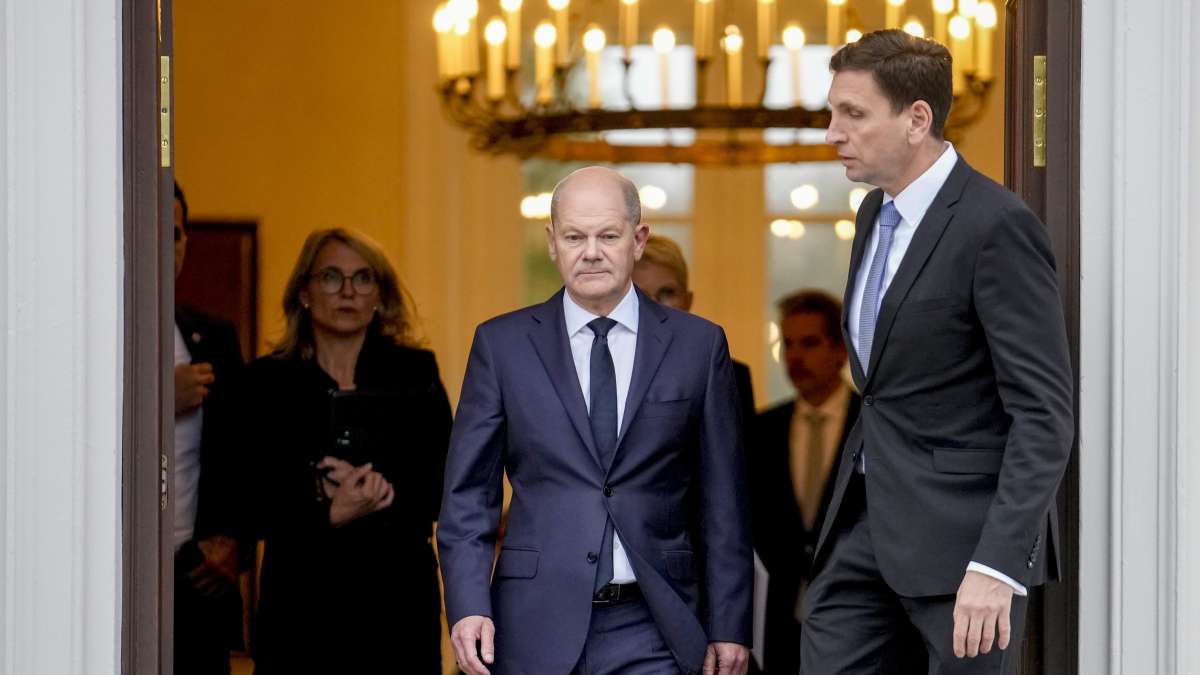
Berlin: German opposition parties and business groups on Thursday urged Chancellor Olaf Scholz to trigger a new election quickly to minimise political uncertainty after his rocky three-way coalition collapsed. The coalition fell apart on Wednesday when years of tensions culminated in a row over how to plug a multi-billion-euro hole in the budget and revive Europe’s largest economy, headed for its second year of contraction.
The break-up creates a leadership vacuum at the heart of the European Union just as it seeks a united response to Tuesday’s election of Donald Trump as US president on issues ranging from possible new US trade tariffs to Russia’s war in Ukraine and the future of the US-led NATO alliance. The chancellor said he would hold a confidence vote in January, which he would probably lose, triggering a new election by the end of March – six months ahead of schedule.
No-confidence motion against Scholz
Friedrich Merz, leader of the opposition conservatives, who are leading in nationwide polls, called for a vote of confidence “by the beginning of next week at the latest”, in comments echoed by other opposition parties. An election could take place in late January,he said. “We simply cannot afford to have a government without a majority in Germany for several months now, followed by an election campaign for several more months and then possibly several weeks of coalition negotiations,” Merz told reporters.
German industry, reeling from high costs and fierce Asian competition, also urged Scholz’s government on Thursday to arrange an election as soon as possible. The uncertainty caused German borrowing costs to jump, with the benchmark 10-year yield GB10YT=RR rising as much as 10 basis points to its highest since July. A key market gauge that signals debt risk as it falls dropped to its lowest on record.
Scholz delayed his departure for Thursday’s European Union summit in Budapest due to the crisis at home and cancelled his attendance at the next United Nations climate change summit.
Scholz fails to secure conservative support
Scholz, of the centre-left Social Democrats (SPD), said he had fired his finance minister, Christian Lindner of the fiscally conservative Free Democrats (FDP), for obstructing a resolution of budget disputes. The last straw was his opposition to Scholz’s plan to ease debt limits in order to increase support for Ukraine in the 2025 budget by 3 billion euros ($3.25 billion). Lindner’s dismissal led to the FDP quitting the coalition, leaving Scholz’s SPD and the Greens running a minority government and relying on cobbled-together majorities to pass any substantial measures in parliament.
A meeting between Scholz and Merz on Thursday failed to solve the impasse, a government source said. Joerg Kukies, a top official in the chancellery and close SPD ally of Scholz, will be named finance minister.
The crisis comes at a critical juncture for Germany, with a flatlining economy, ageing infrastructure and an unprepared military. It is likely to deal another blow to consumption and investment in coming months even as Trump’s return threatens to dampen exports, economists said. The FDP’s exit is likely to spell the departure of the government’s transatlantic coordinator, who has spent months cultivating ties with senior U.S. Republicans in preparation for a possible Trump return to the White House.
Long-term blessings
But the crisis could also be a long-term blessing given the tensions that have plagued the coalition, the first of its kind at the national level, said ING economist Carsten Brzeski. “Elections and a new government could and should end the current paralysis of an entire country and offer new and clear policy guidance and certainty,” he said.
Still, the rise of both leftist and rightist populist parties in Germany, as elsewhere in Europe, means that even a new election might not easily enable a coherent coalition with a clear majority. “You don’t have to be a clairvoyant to deduce … that things will not automatically become easier in the future, even after the next election,” said Economy Minister Robert Habeck of the Greens.
(With inputs from agency)
ALSO READ: Germany enforces tighter curbs on borders to crackdown on irregular migration, extremist attacks